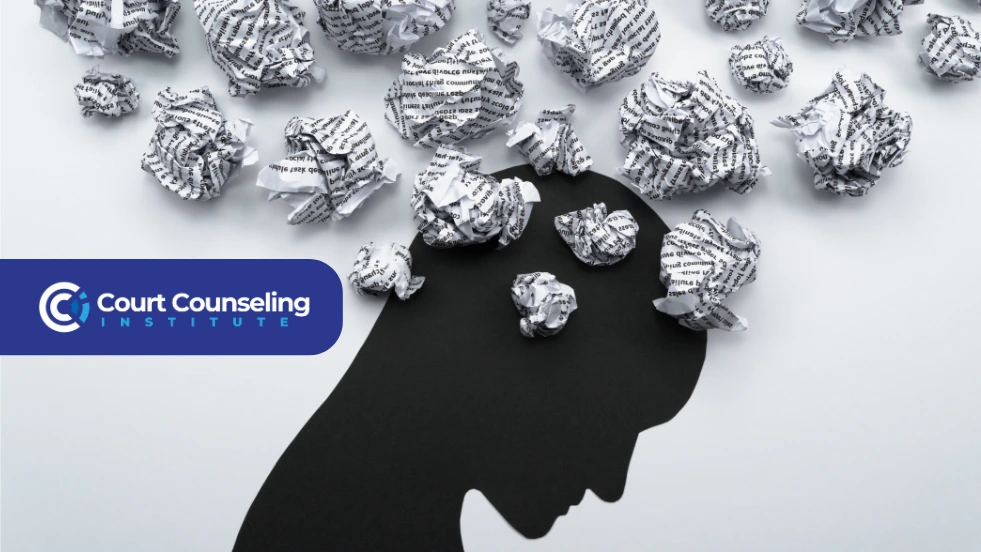
Recognizing The Early Signs of Mental Health Problems And Getting Help
Have you ever caught yourself wondering, “Why do I feel like this?” or “Is this just stress, or something more serious?” Mental health problems often begin quietly and subtly. A few sleepless nights. A shorter temper than usual. Withdrawing from people you care about. These signs may seem minor at first, but they can be early indicators of something more significant happening beneath the surface, often affecting daily functioning and overall well-being in ways that can impact relationships, work performance, and personal safety. In this blog, we’ll explore the top 20 early warning signs of mental health problems, how to recognize them, and why timely support is so important, especially for those navigating legal obligations such as court-mandated counseling and ongoing treatment.
Why Early Recognition Of Mental Health Problems Is Critical
Mental health is not always easy to talk about, especially when you’re overwhelmed or under pressure. But awareness is often the first step toward improvement. Many people, particularly those involved in the legal system, delay seeking support. This could be due to stigma, fear of judgment, or simply not recognizing the signs. However, addressing mental health struggles early on can help prevent them from becoming more serious over time. Whether you’re facing legal stress or helping someone else who is, identifying the warning signs of mental health problems early can lead to better outcomes, both personally and legally.
What Causes Mental Health Problems
Mental health issues rarely stem from a single cause. Instead, they often arise from a complex interplay of factors. Genetics or a family history of mental illness can increase vulnerability, while experiences of trauma or abuse, whether past or recent, can deeply impact emotional well-being. Chronic stress from work, financial struggles, or legal challenges can also wear down mental resilience over time. In some cases, substance misuse may contribute to or worsen existing issues. Major life transitions such as divorce, job loss, or the death of a loved one can trigger emotional distress, as can underlying neurological or chemical imbalances in the brain. Understanding these contributing factors allows us to approach mental health with greater empathy, for both ourselves and those around us. Mental health problems are not a sign of weakness; they are indicators that something in our lives or bodies needs care, support, and attention.

20 Warning Signs of Mental Health Problems: Explained with Care
Mental health affects how we think, feel, and act. Sometimes, struggles with mental health can be hard to recognize, especially in ourselves. However, early signs often appear in our thoughts, emotions, behaviours, and even physical health. If you or someone you know is noticing these signs, it might be a good time to check in, seek support, or talk to a mental health professional.
While these signs can be concerning, it’s important to remember that they don’t always indicate a mental illness. Experiencing some of them does not necessarily mean something is seriously wrong. Mental health symptoms can vary widely, and only a qualified mental health professional can provide an accurate diagnosis. If you or someone you know is struggling, seeking professional help is the best step toward understanding and care.
1. Changes in Sleep Patterns
Sleep is closely tied to mental well-being. Struggling with mental health can lead to sleeping too much, having trouble falling or staying asleep, or waking up too early. Disrupted sleep can also make mental health worse, and it becomes a cycle. If your sleep habits suddenly change for more than a few days, it’s worth paying attention.
2. Irritability or Mood Swings
Feeling easily annoyed, snapping at others, or experiencing sudden mood shifts can indicate emotional stress. These changes may not make sense to you, but they often reflect internal overwhelm or anxiety. Intense emotions that feel hard to control are a common sign of deeper mental health issues.
3. Withdrawal from Friends, Family, or Activities
Pulling away from social interactions, even things you used to enjoy, is a strong signal that something might be wrong emotionally. While alone time is normal, isolation can deepen mental health problems. Avoiding others may feel safer, but connection is often part of healing.
4. Loss of Interest in Things Once Enjoyed
When hobbies or activities you used to love suddenly feel meaningless or exhausting, it could be a symptom of depression or burnout. This emotional numbness can feel confusing, but it’s your brain’s way of signaling that it’s overwhelmed and needs care.
5. Difficulty Concentrating or Staying Focused
Struggling to focus, feeling scattered, or forgetting simple things are all signs of cognitive overload, often caused by anxiety or depression. When your mind is dealing with emotional distress, it has less space for daily tasks, decision-making, or learning.
6. Unexplained Aches, Pains, or Physical Complaints
Mental health issues often show up physically. Headaches, stomach problems, fatigue, or muscle tension with no medical explanation may reflect emotional strain. The brain and body are deeply connected, and emotional stress often takes a toll on physical health.
7. Persistent Feelings of Hopelessness
Feeling like things will never get better, or that there’s no point in trying, is a major red flag. This sense of hopelessness is a key symptom of depression and shouldn’t be ignored, especially if it lasts more than two weeks. It’s a heavy feeling, but with support, things can improve.
8. Significant Changes in Appetite or Weight
Eating much more or much less than usual and either gaining or losing a lot of weight unintentionally often reflects emotional distress. Food can become a way to cope, or you might lose interest in eating altogether. Either extreme can indicate a deeper mental health issue.
9. Increased Use of Alcohol or Drugs
Using substances like alcohol, marijuana, or other drugs to escape feelings or numb pain may seem helpful in the short term, but it often masks the real problem. Over time, this can create more emotional instability and lead to dependence or addiction.
10. Panic Attacks or Intense Anxiety Episodes
If you experience sudden fear, a racing heart, shortness of breath, or feel like you’re losing control, you might be having a panic attack. These episodes are typically linked to anxiety or past trauma. While they can be terrifying, they are treatable with the right support and tools.
11. Overthinking and Excessive Worry
Anxiety often shows up as relentless overthinking, replaying conversations, imagining worst-case scenarios, or constantly worrying about things outside your control. This can be mentally exhausting and interfere with your ability to feel calm or present.
12. Low Energy or Chronic Fatigue
When you’re mentally unwell, your body often feels it, too. Constant exhaustion, even after a full night’s sleep, may signal burnout, depression, or emotional overload. Fatigue that lingers can make daily life feel unmanageable and is a sign that you need rest and emotional care.
13. Negative Self-Talk or Harsh Self-Criticism
If your inner voice is always putting you down, calling you worthless, or blaming you for everything, that’s not true; it’s a symptom of something deeper. This harsh self-talk is common in depression and anxiety and can severely impact self-esteem and motivation.
14. Difficulty Starting or Completing Daily Tasks
Simple tasks, brushing your teeth, answering messages, and doing chores, may suddenly feel overwhelming or impossible. This isn’t laziness. It’s a symptom of emotional fatigue, depression, or anxiety, and it signals that your brain is running low on capacity.
15. Decline in Work or Academic Performance
If your productivity drops, you’re missing deadlines, or you’re struggling to keep up, it may be more than just being busy. Mental health challenges can affect concentration, memory, and drive, making it hard to function in school, work, or other responsibilities.
16. Heightened Emotional Sensitivity
If you’re crying more easily, feeling constantly on edge, or reacting strongly to things that didn’t bother you before, your nervous system might be overstimulated. This emotional sensitivity is often related to anxiety, depression, or unresolved trauma.
17. Engaging in Risky or Reckless Behaviours
Sudden behaviour changes, like reckless driving, impulsive spending, unsafe sex, or substance use, may be attempts to escape emotional pain or feel a sense of control. These behaviours are often misunderstood but usually reflect a deeper cry for help.
18. Compulsive or Repetitive Behaviours
Feeling the need to repeat certain actions (like checking locks, cleaning excessively, or arranging items in a specific way) may go beyond habits. These behaviours can be signs of anxiety or obsessive-compulsive disorder (OCD) and are often driven by an urge to reduce inner stress.
19. Paranoia or Hallucinations
Believing others are out to get you, hearing voices, or seeing things that others don’t can be symptoms of psychosis or a severe mental health condition like schizophrenia. These experiences are not signs of weakness; they are serious and deserve immediate professional care.
20. Thoughts of Self-Harm or Suicide
If you’re having thoughts of harming yourself or ending your life, please know that you’re not alone and there is help. These thoughts are serious warning signs that need immediate attention. Reach out to a therapist, doctor, crisis line, or someone you trust. You deserve support and healing.
The Legal System and Mental Health Problems: A Growing Connection
More courts and legal professionals are recognizing the role that mental health problems play in behaviour. Today, mental health struggles are increasingly being met with treatment requirements, like therapy, education, or anger management programs, rather than punishment alone. At Court Counseling Institute, we support individuals fulfilling these mandates by offering high-quality, court-approved counseling that is both practical and deeply supportive. Whether you’re preparing for court or trying to regain emotional stability, we’re here to help you do both, effectively and ethically.

What To Do If You Notice Mental Health Problem Signs
If you recognize several of these warning signs in yourself or in someone you care about, it may be time to seek help. You don’t have to wait for things to escalate before taking action. Here are some first steps:
-
-
Speak with a mental health professional: A therapist can identify signs and symptoms of mental health problems and guide you through mental health struggles with expert support.
-
-
-
Join a court-approved counseling program online: Structured counseling can address what causes mental health problems, especially if you’re struggling with mental health during legal or recovery processes.
-
-
-
Talk to a trusted friend or family member: Opening up about mental health struggles helps reduce emotional weight and may reveal early warning signs of mental health problems you missed.
-
-
-
Use mood tracking tools or journals: Journaling helps track signs and symptoms of mental health problems and uncover patterns in mental health struggles or emotional triggers.
-
-
-
In a crisis, call 988: If you’re feeling overwhelmed or struggling with your mental health, 988 offers free, 24/7 support through the Suicide & Crisis Lifeline in the United States. It’s available to anyone experiencing urgent warning signs of a mental health problem.
-
Taking action early can make a lasting difference and help restore a sense of control, connection, and hope.
How Court Counseling Institute Can Support Your Mental Health
We know how tough it can be to manage mental health struggles while also meeting legal requirements. At Court Counseling Institute, we’ve supported people through both for over 20 years. Our online programs are flexible, confidential, and accepted across the US and Canada. Whether you’re struggling with mental health privately or facing court mandates, we’re here with nonjudgmental, expert support. Our counseling helps identify warning signs of mental health problems, explore what causes mental health problems, and address emotional challenges at your own pace. You don’t have to face this alone; we’re here to help you find clarity, growth, and lasting mental wellness.
Struggling? Mental Health Support Is Just a Step Away
If you’re navigating mental health challenges or legal obligations, the most important thing to remember is this: you are not alone, and there is help. Contact Court Counseling Institute today to explore your options.


